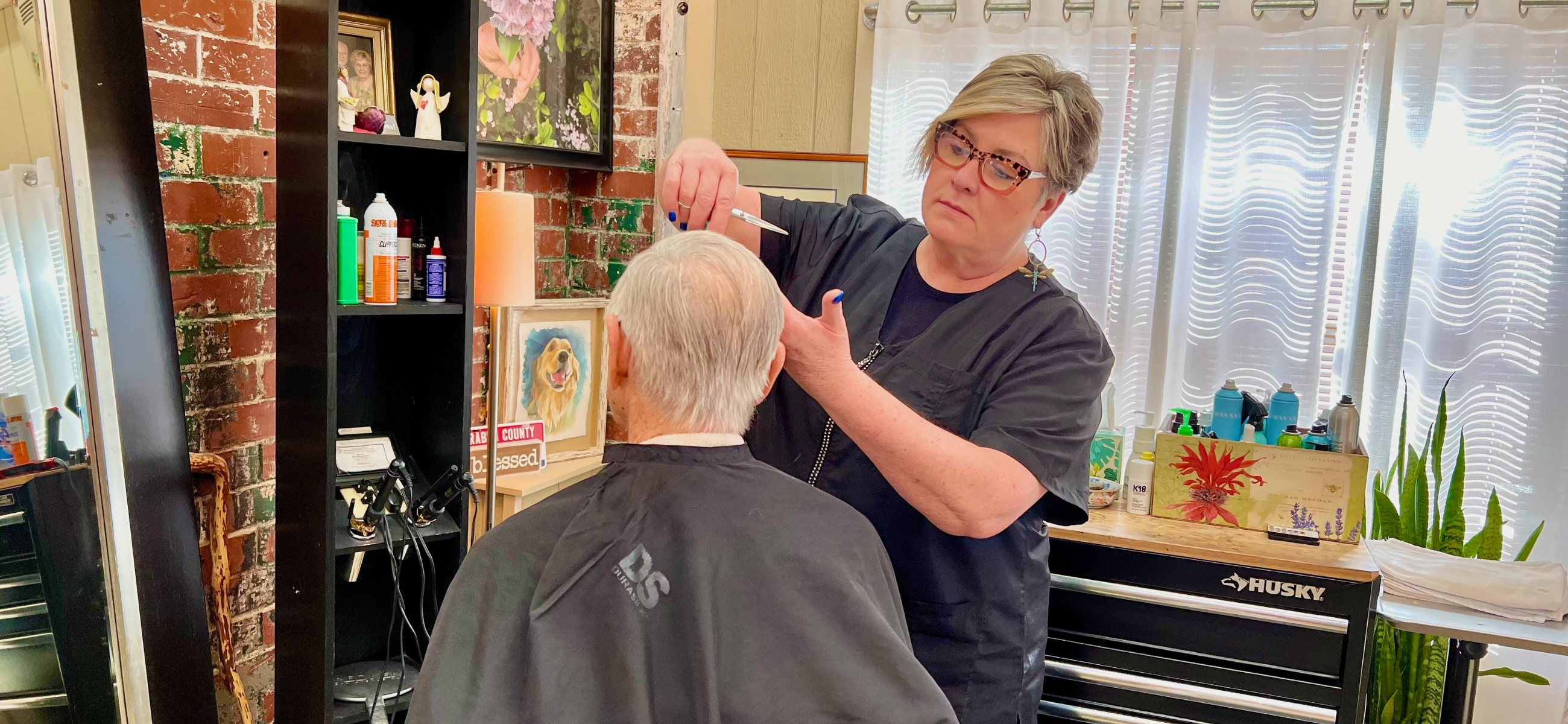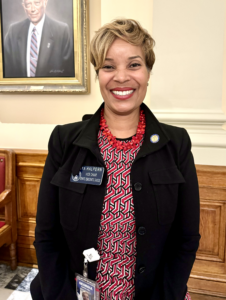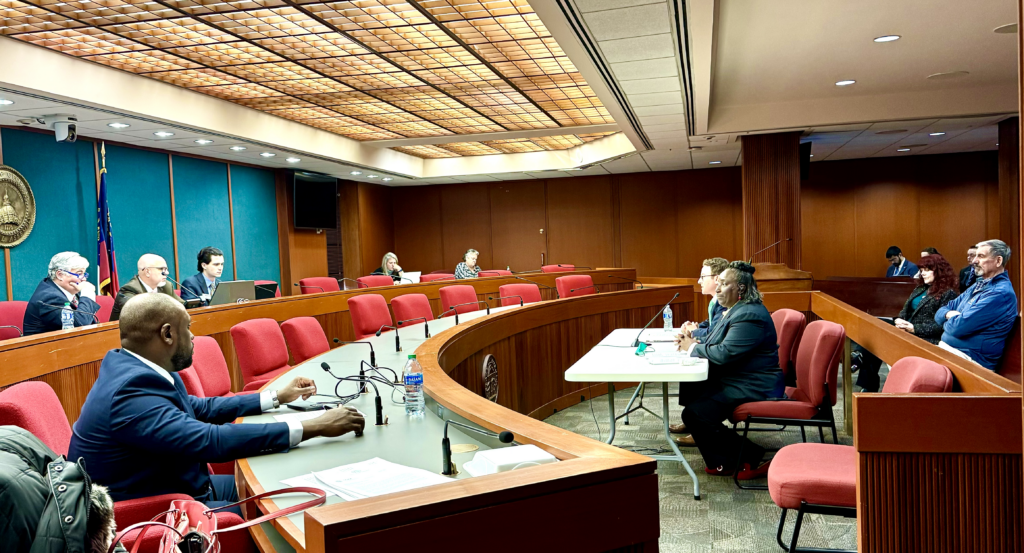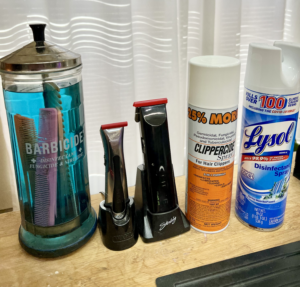Stay ahead of the curve as a political insider with deep policy analysis, daily briefings and policy-shaping tools.
Request a DemoShould your hairdresser or barber need a license? Maybe.

Jenny Coleman, a hair stylist and licensed cosmetologist, cut a client's hair at her salon in Clayton on Jan. 30, 2024. (Credit: Jenny Coleman/Salon 259)
ATLANTA — Three bills aimed at making it easier for beauticians and barbers to bypass licensing requirements and get to work are moving through the Legislature. They face pushback from some lawmakers and industry professionals concerned about safety.
On Monday Sen. Larry Walker III, R-Perry, presented a bill that would exempt some beauty industry professionals from needing a license to work, including those who shampoo, blow-dry and braid hair, and makeup artists. It does not cover people who cut and color hair, or who use lasers and other chemical processes on hair, nails and skin.

Noting that “there has to be a compelling public safety or welfare interest” for the government to require a license that impedes a person’s “freedom to work,” Walker said the Senate Occupational Licensing Study Committee he chaired last year found that cosmetology is among those industries in the state with “some pretty onerous licensing requirements that really are a burden more heavily borne really by the working class in Georgia.”
While makeup artists who work in department stores or on film sets are not required to have a license, said Walker, “if you are a Georgian, an entrepreneur who wants to start a business, a single mom trying to help lift your family out of poverty, we require 1,100 hours of experience and $17,000 for a cosmetology class.” He noted that is 10 times what it takes to get a license to be an emergency medical technician.
Esthetician and master cosmetologist licenses require at least 1,000 and 1,500 clock hours, respectively, of classroom training. EMT licenses require 150 hours.
Several Republican senators lauded Walker’s Senate Bill 354 for slashing red tape and promoting free enterprise.
But Sen. Sonya Halpern, D-Atlanta, said she and 30 salon owners she had talked to about the bill have “significant reservations” about exempting those beauty professionals from licensure and government oversight, primarily for health and safety reasons.
“The beauty industry is more than just about looking good,” said Halpern. “Outside of medical professionals, chiropractors and massage therapists, this is the only other industry where the practitioners’ job requires them to touch your body,” she said.

Halpern said makeup artists “need to have a solid understanding of skin health, and know how to keep their tools clean and safe.” And shampooing and blow-drying professionals “need to understand the right way to untangle your hair without causing damage,” she said, noting that “those specializing in styling with a hair blower, flat iron or curling iron” must be trained to avoid burning and damaging the hair, skin and scalp of their clients. “They also need to know about scalp health and be mindful of conditions like psoriasis and dermatitis that can worsen with the products they use or spread on to the next customer.”
Halpern said she was drafting an alternate bill that would reduce the amount of training required for makeup artists to 300 credit hours and blow-dry artists to 500 credit hours, “so that they can in fact get the knowledge that they need on the sanitation, hygiene and sterilization.”
Walker returned to the Senate well and posited that the industry professionals who oppose the bill “put in their time, and they want the next person to have to put in theirs. Or they’re benefiting from interns that are having to fulfill the 1,500-hour work requirement and they’re paying little or nothing and they’re getting free labor off these people.”
Noting that “five states have exempted blow dry artists and 13 states have released makeup artists from licensure,” Walker said, adding that “there’s no evidence that these services are any less safe” in those places. “And if I go somewhere and get burned, well, I’m not going back. I mean, let’s talk about personal accountability.”
Afterwards the Senate voted 38-15 to pass the bill, which now moves to the House for consideration.
Legalizing mobile barbers
Two other cosmetology-related bills were discussed on Monday during the House Regulated Industries Occupational & Professional Licensing subcommittee meeting.
Rep. Al Williams, D-Midway, presented House Bill 650, which would allow licensed barbers to operate mobile barber shops.
“This is probably the last activity that’s not mobile,” said Williams. “You can give blood, you can go to the dentist, see the doctor, do x-rays, and most importantly, you can buy food out of a mobile truck. But you cannot get a haircut.”
Mobile barbers would be subject to the same safety and sanitary requirements under his bill as barbers operating in fixed locations, said Williams, and “subject to the same rules of inspection.”
Tony West, state director of Americans for Prosperity Georgia, said his organization supported the bill.
“We think this will lead to more entrepreneurship, more small business growth, and maybe some communities getting their hair cut who have trouble getting to a brick and mortar barber shop,” he said.

Kay Kendrick, a salon owner who is chair of the Georgia Cosmetology and Barbers Licensing Board, said she had “a lot of concerns” about the board being able to properly oversee mobile barbers.
Noting that the board has 12 inspectors and that there are 97,000 cosmetology and barbering licensees in Georgia, she said, “There is no way we can govern if we have them going all over the state.”
Kendrick said her inspectors catch illegal activity and unsafe practices every day at the facilities they inspect, including salons that employ unlicensed, sometimes undocumented workers, that don’t properly disinfect tools and commit other safety violations. She noted that the board recently revoked the license of a cosmetology school in the Augusta area for using “illegal tools and injecting off-market Botox into clients, including children.”
Kendrick said it is particularly important for barbers to have hot and cold running water to wash their hands and to disinfect tools.
Williams said he was “willing to do anything to work with the concerns” of the cosmetology board, noting that no mobile barber shop would be allowed to operate “unless it has a built-in generator for hot water — that’s standard.”
He said that mobile food trucks have been able to satisfy state inspectors for years now, and added, “If I can buy a hot dog, I can’t get a haircut?”
“I agree,” said the Regulated Industries Occupational & Professional Licensing subcommittee chair Jason Ridley, R-Chatsworth. “Maybe we need to form some rules in there about what you’ve got to have, how many people can work in it. Let’s keep working on it.”
Allowing interstate cosmetology licensing
Rep. Sandra Scott, D-Atlanta, then presented House Bill 154, to be known as the Cosmetology Licensure Compact, which would create a multistate agreement to allow cosmetologists licensed in one of seven or more states, including Georgia, to practice in any of those states without being required to seek an additional license or training.
The cosmetology compact “is one of several interstate compacts in various professions aiming to facilitate mobility and consistency in occupational licensing,” said Scott.
So far, Alabama, Arizona and Kentucky have already enacted legislation to join the interstate cosmetology compact. Officials in Georgia, North Carolina, South Carolina and Florida are currently working on legislation to join it, said Keith Buckhout, a researcher with the Council of State Governments who co-presented with Scott. Once at least seven states have signed on, the compact would go into effect.

In order to be eligible for the compact, Buckhout said, states must require applicants to pass a competency exam, satisfy basic education and training requirements for cosmetology, and conduct a criminal history or license discipline history background check on applicants. The specifics on those requirements would be hashed out by a commission overseeing the compact. Such information collected on licensees would be kept in a national database.
“We can find out everything we need to know about” cosmetologists who participate in the compact, including “whether they’re legal in their state, so we can stop some of the identity theft with stealing people’s licenses and names, which happens quite often,” said Kendrick, who is in favor of the bill.
Several Georgia cosmetologists and salon owners spoke in support of the cosmetology compact, including Greg Thomas, who said he owns 62 Great Clips salons in Georgia, South Carolina, Florida and Alabama. Thomas said the 6- to 8-week delays in getting back to work that many beauticians face when they move to Georgia while waiting for a new license to be approved cause unnecessary economic hardship.
“We should all do what we can to let these stylists put food on the table,” he said.

Learning of the proposed cosmetology-related legislation on Monday, Jenny Coleman, a salon owner in Clayton who has been a licensed cosmetologist for 33 years, said she would be opposed to exempting any beauty professionals from “basic sanitation and hygiene training.”

“You never know what someone is going to come in with,” she said. “You don’t want to spread fungus, rashes, dermatitis. We really do have to be careful. This is a profession. It’s not for fun. It’s a bit more clinical than people realize. If the state doesn’t regulate this, it’s going to be a mess.”
Regarding the proposed interstate cosmetology compact, she said it could be a boon to salon owners like herself located in the tri-state area in northeast Georgia near the borders of South Carolina and North Carolina. “I think it would be a great boost to business for us to be able to work across state lines,” she said.
Ridley said his subcommittee is likely to further discuss, debate and vote on the mobile barbering and cosmetology compact bills in the next week or two.
Read these related stories:
Have questions, comments or tips? Contact Jill Jordan Sieder on X @journalistajill or at [email protected].
And subscribe to State Affairs so you do not miss an update.
X @STATEAFFAIRSGA
Facebook @STATEAFFAIRSGA
Instagram @STATEAFFAIRSGA
LinkedIn @STATEAFFAIRS
Professionals still face licensing delays amid state’s transition to online system
The Gist Georgia’s professionals and business owners are still struggling to obtain professional licenses in a timely manner. As the Secretary of State’s Office rolls out its new Georgia Online Application Licensing System to expedite the process, the efficiency of this new process is being put to the test. What’s Happening Thursday morning at the …
Controversy over AP African American Studies class grows
Rashad Brown has been teaching Advanced Placement African American Studies at Atlanta’s Maynard Jackson High School for three years. He’ll continue to do so — even though the state’s top education official removed it from the list of state-funded course offerings for the upcoming school year. While Brown prepares to start teaching his class on …
Students, teachers, lawmakers blast decision to end AP African American history classes
ATLANTA — A coalition of lawmakers, civil rights leaders, clergy, educators and students Wednesday called on the state’s education czar to rescind his decision to drop an advanced placement African American studies class from the state’s curriculum for the upcoming school year. “This decision is the latest attack in a long-running GOP assault on Georgia’s …
Kamala Harris’ presidential bid reinvigorates Georgia Democrats
Georgia Democrats have gained new momentum heading into the November election, propelled by President Joe Biden’s decision to bow out of his reelection bid and hand the reins to Vice President Kamala Harris. The historic decision, announced Sunday, is expected to prove pivotal in the national and state political arenas and breathe new life and …




